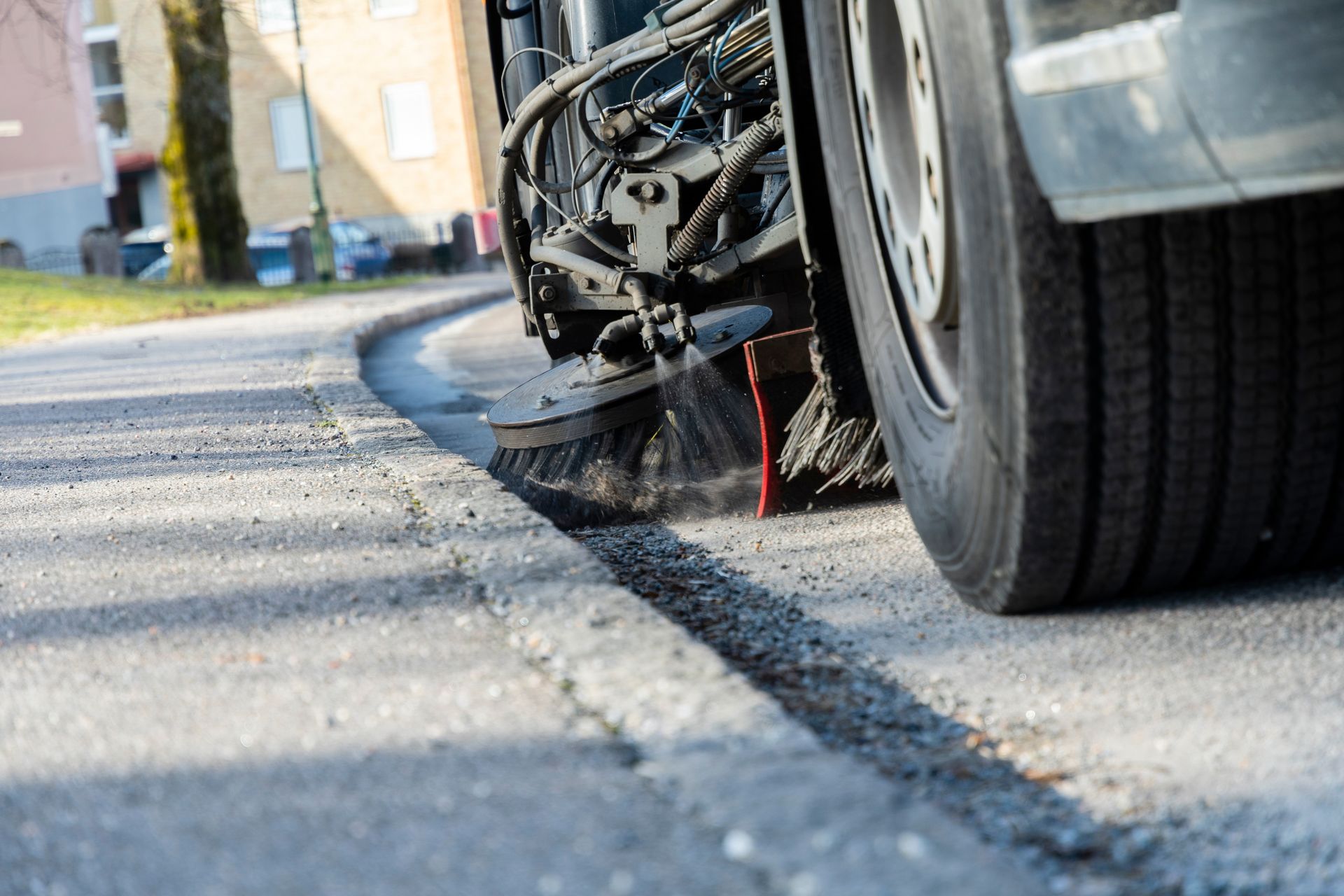Street sweepers have the power to transform communities and projects by maintaining proper cleanliness and aesthetics that add value for all relevant stakeholders.
Beyond this, street sweeping services also help protect local environments by eliminating pollution that can impact air and water quality.
Learn more about the benefits of street cleaning services for the environment, whether you plan to complete a commercial project that requires street sweeping or actively manage a municipality.
What Is Street Sweeping?
Street sweeping eliminates trash, lawn clippings, leaves, debris, and other pollutants from paved surfaces using a specialized vehicle equipped with powerful brushes and vacuums.
Street cleaning services are often contracted by local government agencies, businesses, and private communities to maintain the cleanliness and aesthetics of their paved surfaces.
How Street Sweeping Works
To understand how street cleaning services benefit the environment, it’s important to know how these machines work and what they are capable of collecting. Here’s a quick breakdown of how these machines operate:
- Water Spray: Sweepers typically start with a water spray to dampen dust, preventing it from becoming airborne during cleaning.
- Rotating Brushes: Side and center brushes rotate, loosening dirt and debris from the street surface.
- Vacuum System: A high-powered vacuum sucks up the loosened materials, storing them in a compartment for later disposal.
- Disposal and Processing: Once filled, the sweeper’s storage is emptied, and debris is processed according to waste management protocols, often sorted for recycling where possible.
How Street Sweeping Helps the Environment
Street sweeping has significant environmental benefits that go beyond keeping streets clean. Here are some examples of how street cleaning services positively impact the environment:
1. Pollution Reduction
One of the primary functions of street sweeping is to reduce pollution that can escape from paved surfaces via runoff and end up in local ecosystems.
Street sweeping helps reduce the exposure of local environments to pollution by removing litter, debris, and waste from streets before they are carried away by nature.
Some examples of pollutants that street sweepers remove include:
- Litter: Trash items like plastics, paper, and food wrappers degrade over time, releasing harmful chemicals into the environment. Street sweepers help suck up these trash items before they are carried off into storm drains or blown away into local ecosystems.
- Leaves and Lawn Clippings: Autumn leaves and summer grass clippings can easily make their way onto paved surfaces, where they are carried away by wind and rain. Unfortunately, many people spray pesticides and other harmful chemicals onto their lawns, which makes their exposure to wind and rain potentially toxic for local communities.
- Chemicals: Vehicle leaks leave behind oil, antifreeze, and other harmful substances that can run off into waterways and impact aquatic life.
- Heavy Metals: Brake dust and tire fragments contain heavy metals like lead, zinc, and copper, which harm animals.
2. Waterway Protection
Unfortunately, as rain collects on paved surfaces, it washes away everything on them and discharges pollutants into storm drains, where they are carried off into local water systems. Street sweeping helps reduce the amount of pollutants washed away on paved surfaces by vacuuming them up.
For this reason, street sweeping is often an important part of developing a stormwater pollution prevention plan (SWPPP) and reducing the amount of toxic wastewater that gets discharged from a worksite.
3. Air Quality Improvement
Street sweepers also remove fine particles from roads, including dust, dirt, and other particulate matter. These particles can become airborne, particularly in urban areas or busy construction zones, contributing to poor air quality. By keeping road surfaces cleaner, street sweeping reduces airborne dust, improving air quality and lowering the risk of respiratory issues for residents.
4. Enhanced Soil Health
Another place where pollutants can gather and settle is nearby soil. Heavy metals, chemicals, and litter can accumulate in the soil over time, stripping the soil of valuable nutrients and vegetative cover. Street cleaning services help limit these contaminants, indirectly supporting healthier green spaces and vegetation in urban areas.
5. Flood Prevention
Larger trash and debris can collect around storm drains and even block them, causing water to back up during heavy rain and flooding local areas. Street sweepers ensure that streets and other paved surfaces are free from heavy debris and pollutants that could block discharge points.
6. Wildlife Protection
Animals can mistake litter for food, ingesting harmful substances or even becoming entangled in items like plastic bags and rings. By removing trash from streets, street sweeping protects local wildlife, preventing needless injuries and deaths caused by urban litter.
The Impact of Street Sweeping on Communities
Beyond environmental benefits, street sweeping positively impacts communities by enhancing quality of life and aesthetics. Clean streets are more visually appealing and promote a sense of community pride. Additionally, street sweeping helps:
- Reduce Pests: By removing food waste and other debris, street sweeping reduces the likelihood of pest infestations.
- Lower Maintenance Costs: Regular sweeping minimizes the need for extensive road repairs due to blocked drains and debris buildup, saving cities money in the long run.
- Enhance Property Value: Clean, well-maintained streets contribute to higher property.
Street sweeping offers several benefits for communities, from environmental protection to enhanced aesthetics.
For additional information, contact the experts at Valor Enviromental today!
FAQs
How often should street sweeping be done?
The frequency varies depending on the area and its specific needs. High-traffic areas may require weekly sweeping, while residential areas may only need it monthly or seasonally.
Does street sweeping cause pollution?
Modern street sweepers are designed to minimize pollution. They use water sprays to control dust, and waste is collected and disposed of properly, minimizing environmental impact.
What happens to the waste collected by street sweepers?
The collected debris is typically sorted for recycling where possible, with other waste disposed of at designated facilities according to environmental regulations.

